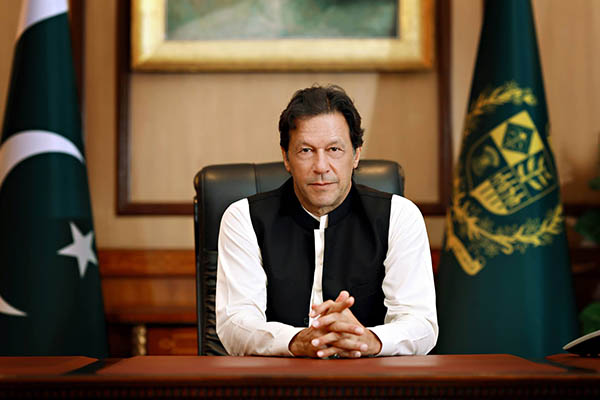
File photo
Pakistan’s prime minister says government will introduce electronic voting, constitutional amendment to end secret balloting in Senate polls
Prime Minister Imran Khan on Tuesday announced that his government plans to introduce an electronic voting system in Pakistan for the 2023 general elections to ensure free and fair polls that are not questioned by the losers.
In a nationally televised address, he said the time had come to introduce electoral reforms to end the practice of losing parties claiming rigging and rejecting the results of polls. “After the 2013 general elections, when every party raised concerns about rigging, I advocated for free and fair elections so no one would question the results of future polls,” he said.
Noting that the Pakistan Tehreek-e-Insaf had staged a dharna in Islamabad for 126 days in a bid to reform the electoral process, he said that after its conclusion a judicial commission led by Justice Nasirul Mulk had been set up to examine rigging allegations.
“We provided all the evidence to the Supreme Court and it was deliberated upon for several weeks. The judicial commission advised a series of steps to ensure the 2018 elections would not have any rigging,” he said, as he recalled how he had fought for neutral umpires while he was a cricketer to curb the practice of teams crying foul when they played tours in foreign countries.
“I want Pakistan to have the type of elections in which whoever loses the polls accepts their results. In the 2018 polls, there were only 102 petitions alleging electoral rigging—which was less than that of 2013. Of these, 24 were from the PPP and PMLN. PTI had 23,” he said.
“I said on the very first day of my premiership that I was willing to examine any allegations of electoral rigging. But after the first meeting of a committee formed to investigate their claims, under the chairmanship of Pervaiz Khattak, the opposition did not attend any further meetings,” he said.
He said he had wanted to brief the public to thank the people of Gilgit-Baltistan for voting for the PTI, as well as to announce the reforms proposed by his government.
Proposed reforms
“We have devised electoral reforms through a committee comprising Azam Swati, Babar Awan, Pervaiz Khattak, and Shafqat Mahmood,” he said, as he listed the proposals.
“We are introducing electronic voting in Pakistan. Our investigations have found that the best system, using technology and used globally, is electronic voting. We are talking to the Election Commission and using data collected by NADRA, we will bring about a system that will ensure the best elections ever conducted in Pakistan,” he said.
Additionally, said the prime minister, the government would introduce a system for overseas Pakistanis so they can also vote electronically. “Overseas Pakistanis are a great asset of the country and they should have the right to participate in the electoral process,” he said.
“The third thing we want to do will require a constitutional amendment,” he said. “We want a show of hands [for the Senate elections] instead of a secret ballot,” he said, claiming that in the past 30 years it had become commonplace for the votes to be bought and sold through bribes and corruption. “Everyone says money talks in Senate polls,” he said, adding that with a show of hands everyone could see which lawmaker voted for what candidate in the polls. “This will end the use of money for Senate polls,” he claimed.
“It is now up to the other parties on whether they support us. This requires a 2/3 majority in Parliament, which we don’t have. It’ll become clear when this comes in Parliament whether the opposition parties support us on this,” he said, noting that the PTI had evicted 20 lawmakers because it believed they voted against party policy after taking bribes. “We are bringing this in because we want free and fair elections,” he stressed, noting that sitting governments never tried to bring about such reforms because they had the resources to buy votes.
The prime minister concluded his address by once again thanking the people of Gilgit-Baltistan. “The conduct of the polls displayed maturity, which bodes very well for the future of Pakistan’s democratic process,” he said. “I promise them once again that we will grant them provisional provincial status in accordance with U.N. resolutions. Our government will also try its hardest to see the potential of this area fully realized to improve the lost of its people,” he added.
